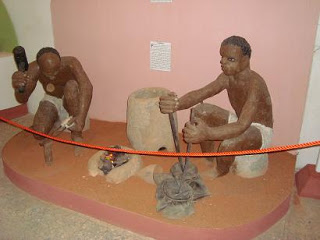With over 136 million items in its museum collection, the heavily funded Smithsonian is run with the aim of increasing and diffusing knowledge to the populace. For years since its creation, the museum has been used as avenue to organise several events like African Arts Film Festival, slated for February this year; Black History month family day; Chocolate Festival and series of events which attract tourists to the country.
Another interesting museum which visitors crave to visit is the most populous Louvre museums in Paris, which recorded about 8.8 million tourists last year. Visitors from abroad accounted for 66 per cent of the museum’s attendees, led by tourists from the United States, followed by Brazil, Italy, Australia and China. Likewise for the British Museum in London widely considered to be one of the world’s greatest home for human history and culture.
It has a permanent collection, which features seven million cultural artefacts from around the world. Nigeria, with more than 250 ethnic groups and diverse cultures is yet to fully grasp what it portends for strategic nation building and foreign revenue earnings, to have a museum of national unity sited in the FCT. The museum, when established, would help to rejuvenate the nation’s culture thereby attracting tourists from other parts of the world which will help to boost socio-economical growths.
In its defence, the National Commission for Museums and Monument (NCMM), the agency tasked with the responsibility of conserving cultural artefacts, has been going round the states establishing museums for posterity.
The agency recently established an exhibition gallery for Igbo Household in Owerri, the Imo state capital, with the aim of reawakening cultures of Igbo people. When a delegation of Chinese investors paid the Director General of NCMM, Mallam Yusuf Abdallah, a courtesy visit in his Abuja office, he said that effort were on top gear towards establishment of the Museum of National Unity where tourists visiting the country could be enriched and educated through visual and written representations our national identity. But observers say that the project can only be realisable when FG has developed interest in injecting the necessary funds into it. In 2002, a slight effort was made by the then Olusegun Obasanjo-led administration to construct a national museum in Abuja (estimated to cost N3bn), ahead of the All African Games.
But the massive project appeared unrealisable through a lack of will and commitment to it.
| yam barn on exhibition at the newly opened gallery in Owerri by Museums and Monument |
Another question worth asking is whether the annual National Council Meeting on Tourism, Culture and National Orientation, where stakeholders regularly meet to discuss and articulate issues relating to culture, has achieved the reason why it was created. It is believed that the culture industry has not received due attention and stakeholders are requesting that government puts aside the unproductive fashion of reading speeches and instead begin to fulfil mandates; now is the time to work proactively towards a great nation. Many nations, particularly those that put cultural matters in front burners, have been generating immense income from it. This is one of the motivations driving the cultural community to stridently call for a national museum to be situated in Abuja; a place where the nation’s cultures are showcased for all comers, including visiting heads of states and governments.
After all, a museum is a central bank of cultural resources where memories are preserved, kept alive and propagated for posterity. It contains our inheritance in works of arts and folklore that have been passed from past generations. The national museum, when built, will be a dignifying co mpendium of the ingenuity of our forefathers, which must be preserved for future generations of Nigerians who will have the need to know their root.
It should indeed tell the story of our existence and landmark achievement over time. Hence, there is need for government to know that no nation can fully develop its potentials unless its people recognise and place a high premium on its culture and should also know that other people of the world can take interest in our country only when we imbibe the correct values.
The government should know that Nigerian art exhibitions have continued to invoke enthusiastic responses in South Africa, Austria, Algeria, Japan and other places around the world. Building the proposed project should be one of the top agenda’s of the Culture, Tourism and National Orientation Minister this year. Meanwhile, the International Museum Day which was instituted by the International Council of Museum to create public awareness of the role of museums in developing society is celebrated very low key here in Nigeria.
The annual festivity is usually shrouded and held at the Cyprian Ekwensi Art and Culture Centre in Abuja with few artefacts and low turnout of spectators. Whereas in other parts of the world where national museums exist with eclectic and properly conserved collections, people trooped in for cultural knowledge and appreciation. Culture analysts believe when this museum is built, it could be used as a catalyst to regain stolen artefacts from colonial times, beginning with the Benin Bronzes, trapped on pedestals in foreign museums. The national museum can also help in repositioning, propelling and galvanising the tourism sector to contribute to the astronomical rise of our national economy.












Recent Comments